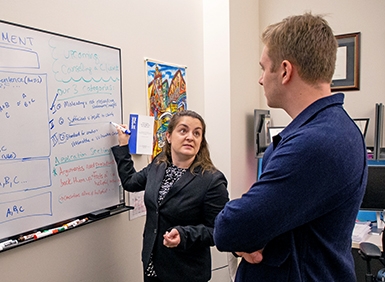Lawyering Up
1L students get their first taste of NYU Law’s Lawyering Program during Orientation, and they continue in the simulation-centered training course for the entire year. The aim is to equip them with real-world lawyering skills—from writing memos to taking affidavits—early in their law school career. But the students aren’t the only ones in the program who are acquiring new expertise. Their teachers are learning, too.
For practicing lawyers who are interested in a legal academic career, it can be difficult to acquire the teaching experience often required for tenure-track positions. NYU Law’s Lawyering Program offers a pathway for career change that emphasizes pedagogy as well as research, while providing students with training from recent practitioners.
“It’s one of the top fellowships for preparing people for teaching,” says former Associate Director of Lawyering Shanda Sibley ’07, now an assistant clinical professor of law at Temple University’s Beasley School of Law. Sibley says that lawyers looking to enter the legal teaching market often take fellowships that focus on research, without realizing the importance of gaining teaching experience. NYU Law’s Lawyering faculty, however, teach three to four days a week for the entire academic year, she notes. “Especially for people who have never taught, I think the program is probably the best preparation that they can get,” Sibley says.
Launched by University Professor Emeritus Anthony Amsterdam in the late 1980s and expanded by John S. R. Shad Professor of Lawyering and Ethics Peggy Cooper Davis, the program emphasizes experiential learning, says Director of Lawyering Andrew Williams ’02. In the first semester, students acquire legal research and writing skills. In the second semester, the curriculum is focused on transactional negotiation, brief writing, and oral advocacy.
“What we have is a program with deep roots in not just being a legal research and writing program,” Williams said, “but really putting students in situations to think about the law and the various issues that they need to be aware of when confronting any new legal problem.”
Take a simulation exercise in which Youlia Racheva ’21 participated during her first semester: an employment dispute in which her section counseled and interviewed a female employer, who was played by a Lawyering teaching assistant (TA). When it came time for mediation, Racheva notes, the client was played by a male teaching assistant. “The dynamic felt like it changed so much...with a male boss and female employee, so we had to re-orient our negotiation strategy based on the optics, considering the social and political climate, and we got to discuss those larger implications as a class,” Racheva says. Now a Lawyering TA herself, Racheva notes that understanding how context impacts interpretation, as is fostered in the course, has been an important part of her legal education.
“Lawyering gives you the foundation for how you should be interpreting things in your other courses,” says Karenna Martin ’21, who is also a TA for the course. “You’re really learning how to interpret cases. You’re learning how legal citations work. How people, when they’re writing their decisions, are backing up their arguments.”
Most lawyering faculty are between three and five years out of law school, some longer, Williams says, and come from a range of specialties, from corporate litigators to public defenders to criminal justice clinicians. “We hire faculty with a lot of different backgrounds,” Williams says. “We've hired some really outstanding practitioners who had really strong ideas about what they wanted to write, but didn't necessarily have any publications yet, and we've hired people who have published a great deal. Hiring depends on where [applicants] are coming from, where they are in their journey, and where they're thinking about going next.”
Lawyering faculty receive a one-year contract, with the possibility for two one-year renewals. The 15 fellows begin working in the summer before classes start, attending a teaching orientation and discussing the curriculum. While teaching is emphasized, research is also a key part of the program. Throughout the year, faculty also participate in a weekly lawyering colloquium, where they conduct mock job talks and discuss current scholarship. The fellows are able to hire research assistants and have book and conference budgets, among other benefits.
With an article on walls and asylum seekers in Europe recently accepted by the Chicago Journal of International Law, first-year fellow Ashley Binetti Armstrong will use her conference budget to present at the European Society of International Law’s conference, "The Future of Europe as a Place of Refuge," in Prague, Czech Republic, this winter. An acting assistant professor of lawyering, Armstrong says that she especially values being able to attend NYU Law faculty workshops, in which faculty present research and discuss works in progress. “It’s a great opportunity to see how people actually operate in academia,” Armstrong says. She adds: “Seeing these different models will help me when I prepare to go on the law teaching market and give a job talk.”
According to Williams, roughly 40 percent of Lawyering faculty move into doctrinal teaching posts, 40 percent move into clinical teaching positions, and another 20 percent move into non-teaching careers in administration, academic success, or teaching positions in legal research and writing.
Former fellow Sibley says that the experiential pedagogy learned through Lawyering has shaped her teaching philosophy throughout her career. “Lawyering gave me some foundational principles that I can build off of in my teaching forever,” Sibley says, noting that this teaching style helps students “to develop ways to understand how to do this later when I’m not there.”
Posted October 21, 2019


